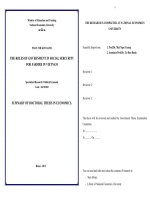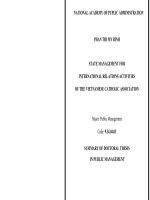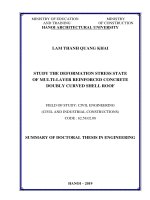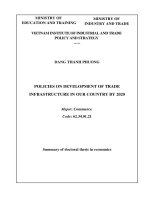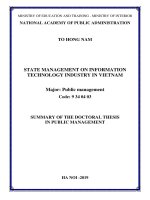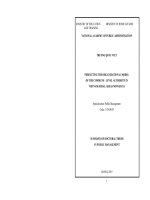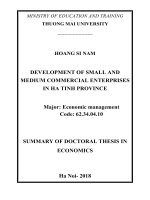Summary of doctoral thesis in journalism studies professional vietnamese journalists’ contemporary qualities approaching from the perspective of ho chi minh
Bạn đang xem bản rút gọn của tài liệu. Xem và tải ngay bản đầy đủ của tài liệu tại đây (383.47 KB, 23 trang )
1
Ministry of Education and Training
Hochiminh Academy of National Politics
Academy of Journalism and Communication
NGUYỄN THÙY VÂN ANH
PROFESSIONAL VIETNAMESE JOURNALISTS’ CONTEMPORARY
QUALITIES - APPROACHING FROM THE PERSPECTIVE OF HO CHI MINH
Professional : Journalism
Major
: Journalism
Code
: 9 32 01 01
SUMMARY OF DOCTORAL THESIS IN JOURNALISM STUDIES
HÀ NỘI – 2019
2
The thesis is completed at
Academy of Journalism and Propaganda
Instructor:
Associate Professor. PhD Nguyễn Văn Dững
Thesis Committee member 1: Associate Professor Ph.D Đinh Văn Hường
Thesis Committee member 2: Associate Professor PhD Đỗ Chí Nghĩa
Thesis Committee member 3: PhD Nguyễn Tuấn Phong
The thesis could be searched at: National Library, Academy of Journalism and
Communication Library - Hochiminh Academy of National Politics
3
INTRODUCTION
1. The urgency of the topic
Overall, the world’s press in recent decades has been volatile, reflecting the
global situation in a multi-colored picture. Journalism in developed countries
like the United States, the Federal Republic of Germany, France, and the United
Kingdom, ... are entangled in national and international issues, heading in the
direction of symbiosis, spreading along with social networks (social media),
accelerating the power of community opinion in social monitoring and criticism
against major national policy decisions in international relations.
Recently, it can be seen that the US press in the 2016 presidential election has
appeared with unpredictable metamorphosis, driven by group interests, which
contradicts the traditional journalism practice - professionalism, objectivity and
honesty in information on domestic issues. Unlike some countries, professional
journalists in the United States are not allowed to join the political party, to
show "professionalism" in the information. However, American media,
generally in the campaign, are obviously swept into the group interest of the
candidates, while, in international affairs, the country's press has more diverse
information, in which critical elements for path-finding become clearer.
The European press is significantly different from the American one, for
the diversity in angles when demonstrating the EU, NATO situation as well as
regional and world issues, of which the most obvious is information of the
Ukrainian crisis, Middle East conflict - North Africa. Regarding issues within
internal EU, the continent's press has shown embarrassment in the development
trend, especially Brexit, immigration issues or relations with Russia; including
the Middle East - North Africa
Overall, there is still a flow of information that cannot be overlooked is the flow
of Russian opinion of all over Europe, especially the United States. Thus, even
though we consider ourselves "objective, honest", Western newspapers are
always drawn into political trends and currents of political forces. The
American press is "stuck" between the power crisis of the two parties Democrat and Republican, between the Democratic Party and President D.
Trump, since the 2016 election.
Right next to us, the Chinese press has always made itself as political and
pioneer leadership tools of the Party of China in domestic and foreign issues.
However, at the same time, the nationalistic journalism in this press always
shows the "tone" of "contemporary Chinese characteristics", which is
aggressive and supercilious in the style of "highway hero ”.
4
Thus, through a general overview of the world’s press and some other countries,
raised questions: Who is a professional journalist and what motivates them to
work? In other words, the model of journalistic career or viewpoints on
contemporary journalist quality both expresses the traditional, regional or
indigenous characteristics in such a clear way, whether in developing or
developed countries, in Europe - America or Asia ....
In Vietnam, during the period of reform, the Vietnamese press has made
considerable accomplishments, contributing significantly to the success of the
national development and international integration. The Vietnamese press has
experienced a rapid growth in terms of quantity, types, publications, staffing,
audience, infrastructure facilities, press technology, financial capacity and
expanding social impact. Topical events and news are up-to-date minute by
minute,... Worrying issues, citizens’ opinion... have been addressed by the
press, attracting the social resources with the participation of institutions and
systems, deservedly representing the voice of the people, a bridge connecting
Vietnam with international friends, becoming the critical tool in national
branding and positive image of Vietnam on the global stage.
Today, thanks to the influence of the scientific and technological revolution in
the world, the communication environment changes rapidly; In particular,
digital technology serves as a cornerstone and increasingly dominate the
characteristics of this environment. Like fish need to adapt to the water
environment, contemporary newspapers in general and Vietnamese newspapers
in particular are changing in accordance with the new media environment. On
the other hand, in this new media environment, their journalists and
practitioners are also posing problems both in terms of advantages and
challenges. In addition, the fast-growing social media are attracting residents
and pulling user community into its forum and influence.
Communication environment is changing. Technology is changing. The public
and press market share are changing. Professional activities of professional
journalists and citizenship journalists are changing. Every human behavior in
the society is changing. In particular, political mindset and activities are
changing, making the social machine no longer the same. A recent issue, in May
2018, the National Assembly session of XIV prepared to pass the Bill on
Special Administrative Region - Economic, as a legal corridor to develop 3 Van
Don special zones (Quang Ninh). , Phu Quoc (Kien Giang) and Van Phong
(Khanh Hoa). The story seemed just to wait for the National Assembly to press
the button, and immediately social media are flared with social criticisms,
mainly opposed to this bill. Meanwhile, our "mainstream press" has hardly any
voices - because as the communication department of the organization, when
the organization has not turned on "green light", the press has to keep silent.
5
So, to awaken, convey to the public who counteracts special economic zone
between 2018, on the occasion of the National Assembly session being
conducted, the main and only focus is social media. This is an issue that needs
attention of the communication department of socio-political organizations,
which is the issue that needs to be researched about the role of journalism and
journalists in the current communication environment; including the notion of
professional quality of journalists in Vietnam in particular, in the world in
general.
Therefore, the notion of professional quality of journalists is either changing
according to the spiral of socio-economic issues in the new media and context;
or need studying under the perspective of journalist career qualities, with a new
theory; operating in combination and inheriting tradition - modernity
horizontally and vertically. On the other hand, the reality shows that the press
approach needs to be more diversified - the press is not only a political ideological tool, but also a constructive social institution - in accordance with
the Prime Minister's message. Nguyen Xuan Phuc stated whether it was
necessary to build a constructive government.
In this context, the role of the journalist - the topics revolving around
journalistic activities become even more important. Who are they and need to
be? Are they just soldiers on the ideological-cultural front, the impulse to lead
the revolutionary career of the Party? Or are they social mobilizers, connecting
communities in close relationships with newspapers and social media? So, with
journalists in the new media environment, do they need to be campaigners and
communicators to be able to complete social titles and social responsibilities?
It can be said that the press of the contemporary world in general and the
Vietnamese press in particular have been posing both basic and urgent issues
related to journalists and professional quality of journalists needing to study.
Save it seriously. Therefore, studying the professional quality of Vietnamese
journalists in the current context is an urgent task.
On the other hand, because of the nature of the journalistic nature that is closely
related to politics, it is difficult for journalists to have a quality of
professionalism that separates the political and indigenous culture of each
country.
In order to contribute to the understanding of the issue of professional quality
journalists, graduate students choose this research problem, with an approach
6
from the basis of Ho Chi Minh thought perspective; perhaps it is a new
approach but suitable for Vietnamese circumstances and conditions.
Ho Chi Minh is the former president and outstanding leader of the Vietnamese
Communist Party and the contemporary Vietnamese revolution. Ho Chi Minh
left thousands of press works with not only valuable content, but also artistic
value to revolutionize newspapers. From the practical experience of the activity,
he summarized and generalized and raised the values imagined in the press
works themselves from events and current affairs. And he left the ideology as a
torch to enlighten and encompass the revolution of Vietnam, continuing to serve
as a guideline for development. In particular, there is Ho Chi Minh thought
about journalism in general and journalists' professional qualities in particular.
President Ho Chi Minh was the founder of the revolutionary press in Vietnam
and also a great journalist. His journalistic career was closely linked to the
revolutionary cause. He often considers the media and journalists as part of the
revolutionary cause, a sharp weapon in the struggle for revolution. Growing up
from the revolutionary process, he became an exemplary professional journalist,
creating a unique Ho Chi Minh style of journalism. In his opinion, the
professional qualities of journalists are reflected in politics, fighting, party and
scientific nature, ethical style, artistic lifestyle using the language, presentation
in the working process. In order to fulfill their glorious tasks, journalists need
to cultivate revolutionary qualities, firmly grasping the policy and guidelines of
the Party and the Government; closer to reality and to the mass. These
professional qualities, according to Ho Chi Minh's thought, are the thread of red
throughout his view of journalists. It is important to adopt and promote those
ideas in order to become a fighter on the cultural front, facing extremely
complex situations in the present real world. Therefore, it is the right direction
to study to deeply appreciate the views of Ho Chi Minh's thoughts on
journalists, to understand the current situation of Vietnamese journalists in order
to specify and build the professional qualities of journalists in the period of
promoted industrialization and modernization of the country.
Since the Seventh Congress (6 -1991), our Party has always affirmed MarxismLeninism, Ho Chi Minh’s Thought is the foundation of thought and the
guideline for the action of the Party and the people of Vietnam. The X, XI, and
XII Legislatures requested "holding campaigns on Learning and Following Ho
Chi Minh's Moral Example, to show that researching, propagating, learning and
following Ho Chi Minh's moral example is of considerable necessity, also one
of the important tasks of the Party's ideological, theoretical and media work,
meeting urgent and essential requirements. It holds a long-term meaning for the
revolutionary cause of the Party and our people.
7
All the above reason considered, the topic of professional qualities of
Vietnamese journalists - approaching from the point of view of Ho Chi
Minh’s perspective is high in practicality, urgency and topicality.
Ho Chi Minh's perspective is a system, bringing together his basic views on
each field of activity, as well as the basic qualities of the subject in each of these
areas of activity. Therefore, approaching from the Ho Chi Minh ideological
point of view about professional quality of journalists, it can be understood that
from the basic point of view in Ho Chi Minh's thought about journalists'
professional quality will be studied as the focus of this thesis.
2. The hypothesis of the research
From this way of address, there comes the following hypothesis:
Firstly, in the current situation of changing media and press environment, how
is the issue of professional quality of journalists in the world and in Vietnam?
And what does this recognition mean for contemporary practice - professional
practice of journalists?
Secondly, in which of his writings did Ho Chi Minh raise the basic points of
view on the journalist's quality of career? And what do these views mean in the
perception and behavior of contemporary Vietnamese journalists?
Thirdly, on the basis of Ho Chi Minh's ideological views on journalistic quality,
whether to model Vietnamese journalists' professional qualities, as well as
contribute to perfecting it through reality. is moving with the influence of the
new media environment, in the context of Vietnam integrating into the
globalization process?
Fourthly, the realization of the professional quality model of Vietnamese
contemporary journalists is setting out what requirements, conditions and
solutions to optimize the journalists' operating capacity in the current
conditions. now on?
3. Purposes and objectives
3.1. Purposes
In the thesis, the theoretical framework is built for the professional qualities of
journalists approaching from the point of view of Ho Chi Minh’s ideology. On
that basis, we carry out survey on the situation, analyze the problems posed and
propose solutions to make a contribution to improving the theoretical and
practical model of contemporary Vietnamese journalistic profession, as well as
8
realizing it to contribute to optimizing the current capacity of Vietnamese
journalists, as well as in the future.
3.2. Objectives of research
In order to achieve the above objectives, the thesis focuses on the following
main tasks:
• Provide an overview of domestic and foreign research projects related to the
research problem of the topic, on the basis of finding out the "gaps" that need to
continue research in relation to the objectives and tasks of the thesis judgment;
• Systematize relevant theoretical issues, Marxist, Angeren and Leninist views
on research issues - the professional qualities of journalists;
• Develop a theoretical framework for journalists' professional qualities of
journalists from the perspective of Ho Chi Minh (HCM). This is considered the
most important task of this project.
• Conduct actual survey of awareness, attitudes and behaviors of Vietnamese
journalists on the basis of ideological viewpoint of HCM on the professional
qualities of journalists; which is acceptable and unacceptable.
• Propose the current model of professional qualities of Vietnamese journalists’
development under Ho Chi Minh's ideology in the context of new media
environment, new circumstances and conditions of the national development
process in globalization and international integration;
• Propose conditions and solutions to ensure the realization of this model; make
scientific recommendations to improve and realize the current model of the
professional qualities of journalists in Vietnam according to HCM ideology;
• The thesis also proposes the following feasible research directions on the
professional qualities of journalists in Vietnam.
4. Subjects and scope of research
4.1. The subject of research
The subject of research is the issue of professional qualities of Vietnamese
journalists with an approach from the point of view of Ho Chi Minh.
4.2. Scope and survey respondents
* Research scope of the topic
Content: From the Party's point of view, "Ho Chi Minh's thought is a
comprehensive and profound system of views on the fundamental issues of the
Vietnamese revolution", so the topic is only limited to important research. basic
9
points in Ho Chi Minh's thought about journalist qualities; on the basis of
surveying the status of Vietnamese journalists' qualities; based on the basic
views in Ho Chi Minh's thought that proposed models and conditions to
completely build and perfect the model of professional Vietnamese journalists'
contemporary qualities.
Time: The time restriction is set from 2001 to present because this is the time of
the 9th Congress (April 2001, when our Party gave a full definition of Ho Chi
Minh’s ideology and issued Directive 23 (3/2003) on "Promoting, researching,
propagating and educating about Ho Chi Minh’s Thought"; The X and the XI
legislatures had both Directives (06 and 03) on "Organizing the Campaign" to
study and follow Ho Chi Minh's moral example. The issue of professional
quality of journalists in the socialist-oriented market economy has become a
deeply social concern, attracting more attention from the society.
The subjects of the survey:
- The first group, surveys on Ho Chi Minh's works to systemize his views and
ideas on the professional qualities of journalists. This group of subjects is Ho
Chi Minh Collection (mainly 15 volumes, the National Political Publishing
House, 2011); monographs, research topics, scientific articles published in the
past 10 years.
- The second group, surveys on perceptions, attitudes and behaviors of
Vietnamese journalists on the professional qualities of journalists following Ho
Chi Minh's ideology, to describe the realistic picture of the professional
qualities of journalists in Vietnam today.
5. Theoretical background and research methodology
5.1. Theoretical background
The thesis is studied based on the theoretical basis:
Firstly, foreign views and theories about journalism and state prevention and
control. This issue is mainly shown in the research overview of the thesis.
Secondly, the viewpoint of Marxist-Lenin about the professional qualities of
journalists, from the viewpoint, concept, concept, structure, criteria system to
the influencing factors.
Thirdly, the views of Ho Chi Minh thought on journalism and state prevention
and control; Next is the views of the Communist Party of Vietnam on press and
the professional qualities of journalists.
10
Fourth, a number of specialized journalism-media theory, in which the notions
of its active subject - the journalist. These theories can be approached in a
number of Vietnamese journalistic works published in the past ten years 1.
To carry out the research tasks appropriate for time and situation above in order
to achieve the research objectives of the thesis suitable to specific condition and
issue, we use the following research methodology:
- Method of document research, which may be called as theoretical research,
used to study research related to the professional qualities of journalists and to
systematize theoretical issues and designate theoretical framework for the issue
of journalistic qualities in the view of Ho Chi Minh’s ideology.
- Methods of collecting quantitative information, including:
+ Interview and Questionnaire Anket method: This is the main method of the
thesis. It is used for questionnaire survey with 400 journalists on the
professional qualities of Vietnamese journalists nowadays to support and clarify
the conclusion. The results obtained in the in-depth interview method serve as a
practical basis for the research. This method seeks to understand the real picture
of the journalists' awareness, attitude and behavior following the professional
qualities of journalists. Regarding the questionnaires, we base on the selected
sample, based on actual conditions and current press appearance.
- Statistical classification method: It is used for statistics and classification of
violation cases in the professional qualities of journalists in the surveyed time
and places. To conduct this method, we base on document of press management
organization (Breau of Journalism,
Ministry of Information and
Communication) together with reviewing on some related resource, especially
“Journalist & Public discussion” Newspaper.
- Methods of collecting qualitative information, including:
- The in-depth interview method was used to interview 17 journalists working
in different newspapers. In-depth interviews were conducted in a group of news
agencies that selected the survey anket, including job positions in the press
agency - from the Editorial Board, professional departments and departments;
At the same time, the author also interviewed the authorities in the leadership
and press management apparatus to refer to the perspective on research issues -
1
Press facility theory; Ta Ngoc Tan Chief editor; Publisher of Culture and Communication; H. 1992; Press theoretical basis;
Nguyen Van Dung; Information and Communication Publishing House; H. 2018 (reprinted). Media theory base Communication; Many authors; Publishing House of VNU; H. 2005; Press theoretical basis; Nguyen Van Ha; National
University of HCM City Publishing House; 2011; Press theoretical basis - General characteristics and style; Ha Minh Duc;
Publishing House of VNU; H.2006; Press monitoring and social criticism in Vietnam; Nguyen Van Dung Chief editor;
Publishing House of VNU; H. 2017; ...
11
the professional qualities of journalists approach from the perspective of Ho
Chi Minh thought.
+ Group discussion method, mainly implemented in the journalism students'
classes in two training institutions, Hanoi Academy of Journalism and
Communication, Hanoi University of Social Sciences and Humanities; mainly
learn about the awareness and attitudes of future young reporters on the access
to the professional qualities of journalists from the perspective of Ho Chi Minh
thought. Each of our training institutions organizes two group discussions in
classes; Each class thus divided into 4 groups discussing the topic yet.
+ Regarding the method of selecting survey samples, researcher uses the
systematic random sample principle - convenient. That is, based on the
classification of press lines, the status of press agencies are distributed across
the country, researcher randomly selects, which is convenient for that system to
collect quantitative and qualitative information (mainly questionnaire delivery
and in-depth interviews)
In addition, to a certain extent, we use other methods such as observation
(combined in the interview process, identifying behaviors of the target group,
testing the information integrity, further illustrating the process of conducting
research); systematization (systematizing the concepts related to the topic),
fieldwork (survey, field work to press agencies and subjects using the press to
understand the concept of journalistic ethics), research into history (study of the
history of professional qualities of journalists), comparison (comparison of
opinions on professional qualities of journalists, comparison of professional
ethics of journalists); Analysis, synthesis (used to analyze, evaluate, synthesize
the results obtained).
6. New contributions to the science of the thesis
The thesis has the following contributions:
• Study the background of journalistic qualities following Ho Chi Minh’s
thought and use it to understand the current situation of professional journalists
in Vietnam. This study will not look new at first, but reassembling the research
results under the theoretical model will give us new results. Perhaps it may be a
new way of making, both inheriting meaning and summarizing the theoretical
and practical issues that form the theoretical framework for the seemingly
familiar problem.
• Propose a system of feasible solutions and recommendations to improve the
professional qualities of Vietnamese journalists, especially the current model of
Vietnamese journalists. Provide a guideline for the criteria, build a program for
raising the professional qualities of journalists of a number of press agencies
nowadays.
12
7. Scientific and practical significance of the thesis
7.1. Scientific significance
The thesis is the first scientific study to basically and comprehensively study
the status quo of Vietnamese journalists - with an approach from the point of
view of Ho Chi Minh. Therefore, the thesis contributes to the basis of
Vietnamese journalistic theory in general and the theory of professional
qualities of journalists in particular, as well as build up the scientific basement
for policies, legal of contemporary press development.
7.2. Practical significance
• Firstly, the findings of the dissertation can help journalists, policymakers, and
managers to provide a realistic basis for building and improving the
professional qualities of journalists. in Vietnam.
●
Secondly, these research results give journalists a comprehensive and
deeper look at their practices, roles and ways of enhancing their professional
qualities in the present.
●
Thirdly, the thesis is a helpful reference for journalists to learn and follow
Ho Chi Minh's moral example, contributing to the development of
contemporary Vietnamese press.
• Fourthly, the research results of the thesis can be used as a source for teaching,
researching journalism in general and professional journalist qualities in
particular for researchers and teachers, educators and learners, especially in the
undergraduate and postgraduate levels, contributing to improving the quality of
training of Vietnamese journalists today.
8. The structure of the thesis
In addition to the Introduction, Research Overview, Conclusion, List of works
of the author, List of references and Annex, the thesis is structured in 5
chapters:
Chapter 1. Overview of thesis subject
Chapter 2. Scientific-practical basis of the issue of the professional qualities of
journalists in view of Ho Chi Minh's thought.
Chapter 3. Basic views in Ho Chi Minh's thought about Vietnamese journalists’
professional qualities.
Chapter 4: Current status of professional quality of today’s Vietnamese
journalists.
13
Chapter 5: Complete model of current Vietnamese journalists’ professional
quality model according to Ho Chi Minh thought.
Chapter 1: Research Overview
In an overview of the works related to the subject matter of the research, we
found that the articles are focused on three main trends, including the direction
of research on the professional qualities of journalists; research on the
professional qualities of Vietnamese journalists in particular; research on Ho
Chi Minh’s thought about the professional qualities of Vietnamese journalists
and solutions to improve the professional qualities of Vietnamese journalists.
1.1.
Research on thesis subject
11.1
Research on the professional qualities of journalist
1.1.1.1 Research on the history of the professional qualities of journalists
The research works in this direction are focused on the cause, the time when the
journalistic ethical code was created.
1.1.1.2. Research on the role of the professional qualities of journalists
When investigating the role of professional qualities of journalists, at different
levels of intensity, the researchers asserted that professional qualities play an
important and even determining role in the success of the journalism. The main
reasons given for this explanation are that professional qualities lay a good
foundation for the successful journalism, closely linked to professional
competence; a new context in which only journalists of good professional
qualities can meet its requirement.
1.1.1.3. Research on the professional qualities journalists need
The professional qualities of journalists are reflected in legal documents in line
with the professional codes and standards of journalists in the world and in
Vietnam. Articles, research papers on the qualities required for journalists, are
derived from the author's point of view, based on documents that regulate the
professional qualities of journalists. Common points in some of the most
general professional qualities of journalists should be honesty, objectivity,
bravery, loyalty to the country, love for the job, eagerness to learn ....
1.1.1.4. Research on the professional qualities of journalists’ relations with
stakeholders
The professional qualities of journalists are also reflected in their relationships
with stakeholders such as readers, editors, etc. The research works on this issue
14
may stem from the systemic approach, which goes from the whole relationship
to each relationship component or from a case study approach that delves into
some specific relationships of journalists.
1.1.2. Research on the professional qualities of Vietnamese journalists
1.1.2.1. Legal documents on the professional qualities of Vietnamese
journalists
The provisions on the professional qualities of Vietnamese journalists are
concretized in documents such as the Press Law, ethical codes.
1.1.2.2. Professional qualities of Vietnamese journalists through the
example of journalists
The works referred to the example of Vietnamese journalists emphasize two
main aspects: professional competence and professional qualities. In particular,
professional qualities are always important. The names mentioned are all prime
examples of journalists in the eyes of international friends and in Vietnam.
1.1.2.3. Characteristic professional qualities of Vietnamese journalists
Research on the characteristic professional qualities of Vietnamese journalists,
the authors approach from two main perspectives: the overall approach and the
typical approach.
1.1.3. Research on Ho Chi Minh’s thought about the professional qualities
of Vietnamese journalists and solutions to improve the professional
qualities of Vietnamese journalists
1.1.3.1. Research on Ho Chi Minh’s thought about the professional
qualities of Vietnamese journalists
Ho Chi Minh's ideology, along with Marxism-Leninism, is the foundation of
thought and a guideline for the action of the Communist Party of Vietnam and
the revolutionary cause of the Vietnamese people. President Ho Chi Minh
emphasized that when it came to the press, we must first discuss about
journalists and their professional qualities.
1.1.3.2. Research on solutions to improve the professional qualities of
Vietnamese journalists
Systematic generalization the theoretical and practical quality of
journalists. These are the perspectives of Marxism-Lenin, Communist Party of
Vietnam and the State of Vietnam for journalists, about the professional
qualities of journalists in Vietnam;
15
-Survey of the situation, point out the strengths, advantages, limitations, defects
in the model and practical qualities of the Vietnam's contemporary journalists
team, the cause and the status.
On the basis of accessing Ho Chi Minh thought about the professional
qualities of journalists; Pursuant to the new context of the international
situation, domestic, environmental and new conditions of press activities to
propose model and conditions of build up, perfect model of professional
qualities of journalists Vietnam in the new situation
* Summary
Thus, through the overview of the works in and outside the country, we realize
that the issue of professional ethics in journalism receives a lot of attention of
domestic and foreign research. In the first direction, although there is no
research on the system of professional qualities of journalists, the authors have
provided useful resources so that we can study about basic theoretical issues on
the professional qualities of journalists. The second trend is the helpful
suggestions for us to carry out research on the current situation of professional
journalism in Vietnam. The third trend supports us in the process of proposing
solutions to improve the professional qualities of Vietnamese journalists.
However, in all three of these trends, the works are only focused on one or some
certain aspects of content, sometimes ending with brief generalizations that are
not systematic about reality, solutions for Vietnamese journalists in the period
of industrialization and modernization with the current trend of integration and
globalization.
In particular, we have also found that there is not yet a complete research and
systematic work on the application of Ho Chi Minh’s ideology to understand
the current situation of Vietnamese journalism. Thus, we define the work that
needs to be continue to research the professional qualities of Vietnamese
journalists is the study of professional qualities of Vietnamese journalists
currently approaching from the perspective of Ho Chi Minh. Starting from Ho
Chi Minh's founded view on the professional qualities of journalists, we
investigate the current situation of professional ethics of Vietnamese journalists,
pointing out success stories, limitations, weaknesses and analyze the reason for
this situation to propose a system of solutions to improve the professional ethics
of today’s Vietnamese journalists. From that point of view, we can state that:
This research direction does not coincide with any published scientific works.
Chapter2. Scientific-practical basis of the issue of the professional qualities
of journalists in view of Ho Chi Minh's thought.
2.1. Basic concepts used in the thesis
16
2.1.1. Quality and career
Accordingly, qualities (ethics) include: "social" (ethical) qualities, politics,
worldview, beliefs, ideals and views, political attitudes, labor attitudes ...
especially the social value; "personal" or ethical qualities, personality
characteristics (temperament, ...); personal will qualities: purpose, decisiveness,
perseverance,
endurance
...;
behaviors
or
manners
...
”
Occupation is a concept often mentioned in the life of social life. The concept of
career
is
quite
diverse
with
different
social
contexts
In the Dictionary explaining linguistic terms, career concepts mean words and
expressions specific to the language of groups of people from the same
profession or the same field.
2.1.2. Journalism and journalists
In this thesis, we view journalists as people engaged in journalistic activity
(investigating, collecting, presenting information as a story or news) and
working in the media (from newspapers, magazines, radio, television and the
internet). Journalists include reporters, editors, office clerks, editors, deputy
editors; they work in press agencies such as news agencies, press and radio
stations and television stations in the central and local areas.
2.1.3. Professional qualities of the press
This concept has been mentioned by researchers in country and abroad.
Referring to domestic and foreign definitions, based on the research objectives
of the thesis, we perceive the professional qualities of journalists as the
journalist's perceptions, attitudes and behaviors. expressed in the course of their
work.
2.2. Theoretical and legal basis of building up professional qualities of
journalists
2.2.1. Marxist-Leninist theoretical basis on the professional qualities of the
journalists
2.2.1.1. Political qualities of journalists
2.2.1.2. Ethical qualities
2.2.1.3. Professional qualities
2.2.1.4. The knowledge, practical experience of journalists
2.2.2. The views of the Communist Party of Vietnam on journalism and the
professional quality of journalists
2.2.2.1. Viewpoint of the Communist Party of Vietnam
17
2.2.2.2. State law and regulations of Vietnam Journalists Association
2.3. PRACTICAL BASIS ON CONSTRUCTION OF PROFESSIONAL
QUALITY OF JOURNALISTS
2.3.1. Impacts of objective application on current newspapers and
journalists
2.3.2. Current situation of newspapers and journalists in Vietnam
Chapter 3. Basic views in Ho Chi Minh's thought about Vietnamese
journalists’ professional qualities.
3.1. HO CHI MINH'S VIEWPOINT
REVOLUTIONARY JOURNALISTS
ON
THE
ROLE
OF
3.1.1. The journalist is an ambusher, pioneering on the Party's ideological
front
3.1.2. Journalists are culturalist for the people, serving the people
3.1.3. Journalists are pioneering soldiers in the example of good people,
good deeds and fighting against negative, anti-enemy types
3.2. HO CHI MINH'S VIEWPOINTS ON THE PROFESSIONAL
QUALITY OF JOURNALISTS
3.2.1. Political and ideological qualities
Ho Chi Minh concretized the political qualities of a journalist by identifying the
mission of the press is to serve the people, to propagate and explain the
Government and Party's opinion and policies. Journalists must have a fighting
spirit; clearly define the Party's strategic lines; must try to study politics, raise
ideas, stand firm on the political position of the proletariat class
3.2.2. Moral qualities, the lifestyle of journalists
Ho Chi Minh stated common moral standards that are common to all classes of
people, including revolutionary journalists: "Loyal to the Party"; "Loyal to the
country, hospitable to people"; "In need, Economy, Transparency, Integrity";
"Knowing to win individualism, selfishness"; "Knowing to put national and
collective interests above personal interests"; "Humble, honest, brave";
"Solidarity and charity".
3.2.3. Expertise qualities, cultural knowledge and living experience of
journalists
18
The professional quality of journalists is reflected in the sensitivity of
discovery, the thinking of analyzing issues with topical issues, and the ability to
write that thinking independently. Spirit's acumen is directly proportional to the
wisdom of the mind. Journalists must write honestly because truth is power,
belief. In particular, journalists need to practice professional writing skills. They
need to be in fast style, respect the truth, accurate and careful on form and
content writing.
CHAPTER 4: THE CURRENT SITUATION OF PROFESSTIONAL QUALITY OF
VIETNAMESE JOURNALIST NOWADAYS
4.1. APPROACHING METHODOLOGY TO SURVEY THE CURRENT
SITUATION OF PROFESSTIONAL QUALITY OF VIETNAMESE JOURNALIST
NOWADAYS
4.1.1. Approaching method
4.1.1.1. Systematic theory method
4.1.1.2. Press functional method
4.1.2. Survey method
4.2. RESULTS OF SURVEY AND PRCTICAL RESEARCH
4.2.1. Political and ideological qualities
The survey results indicate that there is no perfect consistency between the journalist's
awareness, attitude and political behavior. Sometimes, these indicators are not proportional to
each other.
4.2.2. Moral qualities, the lifestyle of journalists
The results of the survey show that there is no consistency between the speeches (or
awareness and attitudes) and the actions of the journalists in their operational process. This is
true of some journalist’s judgments or evaluations when giving some phenomena in reality.
They can not overcome temporary "temptations" in spite of their knowledgeable about
journalist morality. Being intrigued by immediate benefits lead themselve aside from their
duties, turning to be “do as I say, not as I do” person as the result of the fact that they could
not resist the temptation of material life.
4.2.3. Expertise qualities, cultural knowledge and living experience of journalists
To a certain extent, almost journalists have a harmonious combination of awareness,
behavior and attitudes in expertise qualities. With the right understanding of required
professional qualities, with a whole-hearted progressive and serious attitude, and with a
passion for journal profession, journalists have been flexible and skillful in using their
professional knowledge to create quality press works.
4.2.4. Causes of the situation
4.2.4.1. Cause of the advantage
4.2.4.2. The causes of the limitations
Conclusion of chapter 4
Vietnamese journalists have many advantages in professional quality such as
preserving and promoting the inherent traditions of revolutionary journalism according to Ho
19
Chi Minh ideology. In the new era, Vietnamese journalists are always keen on training and
developing digital skills to meet the development requirements of the world and the demands
of modern readers. The majority of journalists have their good professional qualities, and are
worthy of being soldiers on the cultural and ideological front, with "bright mind, integrity,
sharpness” as the journalist Huu Tho said. It is the relative unity between the political
qualities, the moral qualities and professional qualities of journalists that create the
professional quality of journalists.
Along with the advantages, Vietnamese journalists have been also revealed
limitations in their awareness, attitude and actions in their professional qualities. Through the
surveys and in-depth interviews, journalists have frankly acknowledged their shortcomings
and their colleagues’s. Accordingly, although these restrictions exist only in a part of
journalists, it is still very worryin. It can lose the confidence of the society and affect the
reputations of true journalists, and moreover create unpredictable consequences because of
the fact that the press is the voice of the people.
In the process of doing the survey and analyzing the survey results, we have found
that the journalists' self-assessments and journalist's assessment of their colleagues are very
accurate. The overall picture of these above assessment on the professional quality is gloomy
partly. That also reflects their awareness and serious attitude in responding to the survey. At
the same time, they also show their honesty, care, progressiveness to contribute for
improving professional qualities in genernal.
In some cases, the expression of political qualities, moral qualities and professional qualities
in journalists on the aspects of awareness, behaviors and attitudes are uneqyal. Therefore,
moral quality is the expression with the lowest average value.
Chapter 4. Current status of professional quality of today’s Vietnamese
journalists.
4.1. General investigation, field survey on professional quality of today’s
Vietnamese journalists.
4.1.1. Approaching method
4.1.1.1. Systematic theory method
4.1.1.2. Press function method
4.1.2. Field survey method
4.1.3. The content of the investigation , the field survey
4.2. Survey results, field survey
4.2.1. Political qualities
4.2.2. Ethical qualities
4.2.3. Professional qualities of journalists
4.2.4. The cause of situation
20
4.2.4.1. Advantages
4.2.4.2. Cause of limitations
Chapter 5: Complete model of current Vietnamese journalists’ professional
quality model according to Ho Chi Minh thought.
5.1. VIEWPOINTS OF CONSTRUCTION AND COMPLETE MODEL
OF PROFESSIONAL QUALITIES OF VIETNAMESE JOURNALISTS
5.1. 1. Approaches
5.1.2. New policy of the Party and State on Vietnamese press
5.2. PROPOSED MODEL OF BUILDING AND IMPLEMENTING
PROFESSIONAL QUALITIES OF VIETNAMESE JOURNALISTS
FOLLOWING THE HO CHI MINH VIEWPOINT
5.3. CONDITIONS FOR MODEL
5.4. RECOMMENDATION
MANAGEMENT ON PRESS
FOR
IMPROVEMENT
OF
STATE
5.4.1. Recommendation to Party, Government
5.4.2. Recommendation to Vietnam journalist association
5.4.3. Recommendation to Press agencies
5.4.4. Recommendation to journalists training academies
5.4.5. Recommendation to journalists
CONCLUSION
1. Researching the professional qualities of journalists is one of the issues raised
by many domestic and foreign researchers. In addition to the achievements,
these studies also have a lot of "vacant land for continuing research. At certain
levels, some works covered a number of minor aspects of our research.
However, through the review of the study, we affirm that the derivation from
the approach of Ho Chi Minh’s thought to understand the professional qualities
of journalists in today’s Vietnam is a new research direction without
coincidence with any previous works.
2. The professional qualities of journalists are harmoniously and uniformly
expressed through their political qualities, moral qualities and professional
21
qualities, through the perception, attitudes and behaviors of each journalist. .
The red thread was in the thought of the journalists of Karl Marx, Engels,
V.Lennin and Ho Chi Minh as revolutionary journalists. Their revolutionary
qualities are the guide, the basis of all journalistic activities. The ultimate
purpose of the press is to serve the people, for the benefit of the people. It is a
dialectical thinking flow in the museum of ideology, political theory that the
great journalist leaders left for humanity.
3. Ho Chi Minh's whole life is a shining example of revolutionary press
activities to be followed by Vietnamese journalists. Although not systemized
into the theoretical system of press statement and journalists, his speeches,
articles, instructions ... are the priceless treasures of press and journalists for us.
Each sentence and word in his legacy is a reminder to Vietnamese journalists in
any circumstances who have to pay attention to cultivate revolutionary virtues,
train, improve political qualities, actively learn, to develop their professional
qualifications and skills, to take control of their press works. On that basis, the
journalist becomes a powerful force, always listening and becoming a voice,
expressing the thoughts and aspirations of the people. To achieve that,
journalists must live in the people, understand, sympathize and always for the
people, for the country.
4. In harmony with the atmosphere of the world, Vietnam also entered the
modern stage of integration and globalization. The dynamic transformation of
economy, politics, society, culture, education and all aspects of life under the
influence of the 4.0 revolution has brought many opportunities and challenges
to all fields, including the press. With the rapid increase in both quantity and
quality, the Vietnamese press has affirmed its position in the process of building
and developing the country. In addition, the press of our country also revealed
the limitations and somewhat embarrassing mistakes and challenges of the
present Among those, giving false information, causing serious consequences,
losing the trust of the public is the most worrying matter.
5. To become the driver of the Vietnamese press, journalists are the team that
decides whether it may make or break. With the fast and strong growth in
quantity and quality, the Vietnamese journalists deserve to be soldiers on the
cultural front, in the new era. Journalism is a glorious career with no fewer
difficulties, challenges and danger. In the face of all temptations, most of them
retain the revolutionary quality, with clear mind and cold head in a hot heart.
Every day, every hour, they rolled in every corner, illustrating the real life of the
Vietnamese people in an objective and true way. They always carry out their
tasks, no matter how hard they are. People and public opinion always see them
in a positive light - the most loyal, enthusiastic and bravest "secretary of the
era”.
22
6. In the countless examples of journalists, though not many, but a part of
journalists are corrupt, breaching the codes of ethics. This has caused an
unpredictable and extremely dangerous predicament not only to individual
journalists in Vietnam in particular, the press in Vietnam in general but also to
the development process of the country. Therefore, the limitations need to be
resolved thoroughly from the root to bring the bright picture of the
revolutionary press to our country. The deterioration in journalists manifests
itself in different aspects and levels. It may be their incomplete perception, even
their misconceptions about the professional qualities they themselves need. It
may also be a non-cooperative attitude, not strictly enforcing professional
quality conventions, even though the journalists understand it well. More than
that, there are clever ploys in the process of being tempted into the immediate
personal interests, forgetting the interests of the collective, of the nation, even
"diverting themselves" to the opposite polar. The figures on the press’s fines in
the past 10 years are an alert to the degradation of professional qualities of
journalists in our country.
7. The picture of the professional qualities of Vietnamese journalists through the
survey with an approach from the perspective of Ho Chi Minh’s thought shows
that the bright areas still predominate over dark areas. That allows us to believe
in a future with a team of professional journalists Vietnam of modern and
international level. However, we also need to pay special attention to the
limitations and phenomena of corrupt journalists. All the forces in society,
especially the journalists themselves, have to join hands, actively push back
these shortcomings. It is not a job that last a day to be a success, but a long,
persistent and consistent process. The process of repelling these defects will
surely be faced with many difficulties from the enemy, the moments of
embarrassment, and temptations of the immediate material interests. Therefore,
in order to be successful, the cultivation, training and mistake correction must
be made in the light of reason and solid practice.
8. From the point of view of Ho Chi Minh on the professional qualities of
journalists and the current situation of Vietnamese journalists, we align
dynamic models of professional qualities of journalists with the requirements of
contemporary Vietnamese journalists evaluated feasible by the experts. With
the cognitive, attitudinal and behavioral components attached to each group of
qualities (political qualities, ethical qualities, professional qualities), this model
is based on the framework of professional qualities of Vietnamese journalists
outlined by us. The training process of journalists takes place in each cognitive
element, attitudes and behaviors in each subgroup of professional qualities and
among its dialectical effects. Coherent ties keep journalists harmonizing all
qualities so that they can have good professional qualities. The inevitable result
of this practice is the quality of the press work. From the acquisition and
development of Ho Chi Minh's thoughts on journalists, the essence of the
23
Vietnamese journalist's professional qualification model proposed in this thesis
is the harmonious combination, the traditional and modern nature of a
journalist. Promoting the tradition of Vietnamese revolutionary journalism in
the modern context is not a simple matter. That requires the journalist to have
good mind and heart. But the mind and the heart of the modern age mean their
working hard to overcome all the sophisticated challenges and barriers in
today's flat world. It can be said that the choice and firm belief in journalism in
modern times has been a courageous thing to journalists. Keeping walking till
the end of the road is a great honor.
9. In addition to proposing the journalist's professional qualities as the
continuation, development and summing up of contemporary Vietnamese
journalists' needs for the theoretical foundations, we particularly note about
joining hands with participation of all parties involved in the process of training,
improving the professional qualities of Vietnamese journalists. The consistent,
favorable and strict management from agencies will simultaneously create a
good legal corridor for journalists and also the place pointing them to the
limitations and mistakes which need repairing. The activeness of the journalists
themselves will be a decisive factor in the improvement of their professional
qualities. The trust and love of the people, the public will be the most valuable
motivation, creating a invaluable source of strength for journalists to take a firm
step on their path.
10. Within the framework of a thesis, despite the desire to solve many
problems, we still have to focus on the main objective set to study the current
situation of the professional qualities of journalists in Vietnam - From the point
of view of Ho Chi Minh’s thought. There are many directions for further
research into the qualities of Vietnamese journalists in a longer time frame, such
as studying each component of the professional qualities of Vietnamese
journalists - approach from the point of view of Ho Chi Minh’s ideology
(research and proposal on regulations of political qualities, qualifications of
Vietnamese journalists - approach from Ho Chi Minh’s perspective ...); factors
affecting the professional qualities of Vietnamese journalists; conditions to
ensure the development of professional qualities of Vietnamese journalists;
criteria for assessing professional qualities of Vietnamese journalists…
